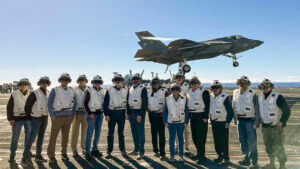
Abilene Christian University is breaking new ground with its Nuclear Energy eXperimental Testing Laboratory, or NEXT Lab, creating exciting opportunities for students and faculty. A key example is Dr. Rusty Towell’s recent invitation to the U.S. Navy’s Distinguished Visitor Program, allowing a behind-the-scenes look at the world’s most experienced operator of nuclear reactors.
As part of the program, Towell, professor of engineering and physics and director of NEXT Lab, spent time aboard a nuclear-powered aircraft carrier based in San Diego. He witnessed flight operations, toured engineering spaces, and got an up-close view of the intensive training and safety protocols that have allowed the Nuclear Navy to operate thousands of reactor-years without a single nuclear incident.
The Navy’s outreach reconnects Towell to his own service as a former nuclear instructor for the military after graduating from ACU in 1990. But this time, the experience holds new significance for ACU’s future in helping meet workforce needs for the advanced nuclear industry.
Under a sponsored research agreement with Natura Resources, ACU’s NEXT Lab will house one of the only advanced reactors designed specifically for training the next generation of operators and pioneers, Towell said.
The lab’s mission is to provide global solutions to the world’s need for energy, water and medical isotopes by advancing the technology of molten salt reactors while educating future leaders in nuclear science and engineering. The first-of-its-kind, liquid-fueled molten salt reactor will have numerous applications because of its small size and portability.
Connections such as Towell’s are providing valuable assistance to students as they explore their post-graduation career paths.
“In addition to our cutting-edge work on molten salt reactors, we have an opportunity to become a unique pipeline for developing the nuclear workforce of the future,” he said.
The military has been the driving force behind harnessing nuclear power for practical uses like powering submarines and ships. “As we develop safety protocols for NEXT Lab, we’re looking to world leaders in safety, and no one’s operated more reactors longer and more safely than the U.S. Navy.”
Towell’s aircraft carrier visit allowed him to observe first-hand the Navy’s nuclear operational mindset – one ACU hopes to instill as it trains students on its advanced reactor. From the officers managing a ship’s nuclear propulsion to a sailor inspecting a simple valve, the highest standards of safety and accountability permeate every role.
It’s a culture of uncompromising vigilance, Towell noted. “Every individual, whether manning a console or changing an air filter, understands their role in the bigger nuclear safety picture. That’s the level of safety ownership we need to develop with our students for advanced reactors.”
While ACU already has alumni serving in the military’s nuclear program, Towell’s invitation underscores how the university’s national profile and opportunities are expanding thanks to NEXT Lab.
As ACU builds expertise around advanced nuclear operations and develops curriculum in this cutting-edge field, more students will be able to explore related career paths – from military, to private industry, to entrepreneurship.
“Our students want to make an impact,” said Towell. “NEXT Lab, powered by Natura Resources, will give them unrivaled hands-on experience to change the world through advanced nuclear solutions – and carry that spirit of operational excellence into any field they pursue.”
–Robin Saylor
April 9, 2024
Learn more about NEXT Lab
Learn more about Natura Resources
Learn more about the Department of Engineering and Physics
